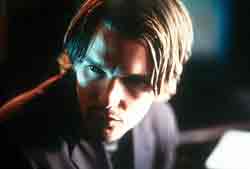Not so, says the 29-year-old, who becomes the first actor under 30 to play the role onscreen. “The piece is so rich, I just feel that any actor had something to bring it,” he explained. “I had a very clear idea of why now, why to do it again. It wasn’t really about who was playing Hamlet so much as … the play as a whole. If the point is just to go see another actor doing it, who cares? The production had to take the audience to a new place with the play.” That it does. Set in 21st century Manhattan, Almereyda’s film brims with clever permutations and in-jokey twists: Here the Danish court is a corporate monolith, the Denmark Corporation; the ghost of Hamlet’s father (Sam Shepard) wafts into a Pepsi machine; and Ophelia (Julia Stiles) pouts and snaps photographs in hip-hop togs. As for Hawke’s Hamlet, he’s a grungester video-filmmaker, greasy-haired and techno-savvy, who soliloquizes his heart out in the action-flick aisle of Blockbuster. “It’s highbrow in that the themes are kind of exciting and rich,” said Hawke, “but it’s all about fathers, sons, ghosts. It’s all very accessible and very available, and I think that was part of our goal. Neither Michael (Almereyda) nor I is a Shakespeare scholar. We just tried to bring a jubilant love of it.” Still, just that indelible image of Olivier, blond, black-tighted, and burning with emotion, would be enough to send other actors scurrying. Hawke, though, refused to be intimidated. “I decided at a certain point after watching [other adaptations] that what I really loved was studying the play,” he said. “I was just deriving my own opinions about the character … and trying to make it personal to me, to bring something of myself to it.” The actor, whose big break came in 1989’s Dead Poets Society, worked with a coach to get a handle on the sumptuous language, but he insists there was no pressure to step up his knowledge of classical acting. “It’s just like Paul McCartney,” he explained. “If he had any proper musical training, he wouldn’t have written half of the songs that he did. He would change the musical time in the middle of a song; he didn’t know you weren’t supposed to do that. And in a certain way you can use [classical training] as a crutch to inhibit creativity.” This distinctly “American” approach to the tragedy wasn’t the only element Hawke found artistically freeing. He was also among friends: Almereyda once helped Hawke edit a short film; costar Steve Zahn (Rosencrantz) has performed with Hawke’s small Off-Broadway theater troupe; Sam Shepard played Hawke’s father in last year’s Snow Falling on Cedars; and costar Dechen Thurman (Guildenstern) is the brother of Hawke’s wife Uma. “History teaches you that working with friends is where a lot of people do their best work,” said Hawke, who again summons a rock ’n’ roll metaphor to complete his thought: “Would Mick Jagger be Mick Jagger without Keith Richards? Would Keith be anybody without Mick? Through friendship, you have the opportunity to do really personal, intimate work.” Indeed, Hawke, who is currently laboring on a second novel (his first, The Hottest State, debuted in 1996), his own video-filmmaking projects, and playing daddy to two-year-old daughter Maya, sounds as introspective as the Dane when he ponders something rotten in, well, the state of Hollywood. “It’s so hard to make a movie that even has the possibility of being great, you know what I mean?” he asked. Then, referring to his own 1994 hit with Winona Ryder, he added: “They won’t be doing another production of Reality Bites in 25 years. They really won’t. It’s a good movie; I like it. But a good production of Hamlet makes you think about an existential dilemma. It’s profound.”
